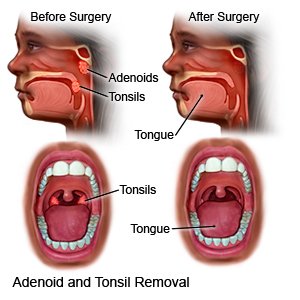Tonsillectomy
Medically reviewed by Drugs.com. Last updated on Apr 6, 2025.
A tonsillectomy is surgery to remove your tonsils. You may need this surgery if you have obstructive sleep apnea, get tonsillitis often, or have tonsil cancer or stones.
 |
DISCHARGE INSTRUCTIONS:
Call your local emergency number (911 in the US) if:
- You have trouble breathing.
Seek care immediately if:
- You have signs of dehydration, such as dry mouth or eyes. You may urinate less than usual or not at all.
- You have severe pain.
- You are vomiting.
- You have a fever higher than 102°F (39°C), or a low-grade fever for longer than 2 days.
- You have bright red bleeding from your throat, nose, or mouth, or your bleeding that gets worse.
Drugs used to treat this and similar conditions
Penicillin VK
Penicillin VK is used for bacterial infection, clostridioides difficile infection, cutaneous ...
Bicillin L-A
Bicillin L-A is used for bacterial infection, congenital syphilis, glomerulonephritis ...
Ozempic
Learn about Ozempic (semaglutide) for type 2 diabetes treatment, weight management, cardiovascular ...
Bicillin C-R
Bicillin C-R is used for middle ear infections, pneumonia, skin or soft tissue infection ...
Pfizerpen
Pfizerpen is used for actinomycosis, anthrax, aspiration pneumonia, bacteremia, bacterial ...
Bicillin C-R 900/300
Bicillin C-R 900/300 is used for middle ear infections, pneumonia, skin or soft tissue infection ...
Penicillin g benzathine/procaine penicillin
Penicillin g benzathine/procaine penicillin systemic is used for middle ear infections, pneumonia ...
Penicillin g sodium
Penicillin g sodium systemic is used for actinomycosis, anthrax, aspiration pneumonia, bacteremia ...
Penicillin g potassium
Penicillin g potassium systemic is used for actinomycosis, anthrax, aspiration pneumonia ...
Penicillin g benzathine
Penicillin g benzathine systemic is used for bacterial infection, bejel, congenital syphilis ...
Call your surgeon or doctor if:
- You have new or worsening symptoms.
- You have questions or concerns about your condition or care.
Medicines:
You may need any of the following:
- Prescription pain medicine may be given. Ask your healthcare provider how to take this medicine safely. Some prescription pain medicines contain acetaminophen. Do not take other medicines that contain acetaminophen without talking to your healthcare provider. Too much acetaminophen may cause liver damage. Prescription pain medicine may cause constipation. Ask your healthcare provider how to prevent or treat constipation.
- Acetaminophen decreases pain and fever. It is available without a doctor's order. Ask how much to take and how often to take it. Follow directions. Read the labels of all other medicines you are using to see if they also contain acetaminophen, or ask your doctor or pharmacist. Acetaminophen can cause liver damage if not taken correctly.
- NSAIDs , such as ibuprofen, help decrease swelling, pain, and fever. NSAIDs can cause stomach bleeding or kidney problems in certain people. If you take blood thinner medicine, always ask your healthcare provider if NSAIDs are safe for you. Always read the medicine label and follow directions.
- Take your medicine as directed. Contact your healthcare provider if you think your medicine is not helping or if you have side effects. Tell your provider if you are allergic to any medicine. Keep a list of the medicines, vitamins, and herbs you take. Include the amounts, and when and why you take them. Bring the list or the pill bottles to follow-up visits. Carry your medicine list with you in case of an emergency.
Self-care:
- Drink liquids as directed. Liquids help prevent dehydration. Liquids and foods that are cool, such as water, apple or grape juice, and popsicles, will help decrease pain and swelling. Do not drink citrus juices, such as orange or grapefruit. These may irritate your throat. Do not drink hot liquids such as coffee, tea, or soup. These liquids may hurt your throat.
- Do not use straws for up to 2 weeks, or as directed. A straw may increase your risk for bleeding.
- Eat soft foods for 10 to 14 days to decrease pain while you eat. Examples of soft foods include applesauce, scrambled or boiled eggs, mashed potatoes, gelatin, and ice cream. When you can eat soft food easily, you may slowly begin to eat solid foods. Avoid anything hot, spicy, or with sharp edges, such as chips.
- Care for your mouth as directed. Gently rinse your mouth as directed to remove blood and mucus. The white scabs that will form in the back of your throat will cause bad breath. This is normal. Brush your teeth gently. Avoid harsh gargling or tooth brushing. These can cause bleeding.
- Limit activity for 7 to 10 days after surgery. Get plenty of rest. It may take 1 to 2 weeks for you to recover. Ask when you can drive and return to work and other daily activities.
- Do not smoke. Nicotine and other chemicals in cigarettes and cigars can prevent healing after surgery. Ask your healthcare provider for information if you currently smoke and need help to quit. E-cigarettes or smokeless tobacco still contain nicotine. Talk to your healthcare provider before you use these products.
Follow up with your surgeon or doctor as directed:
Write down your questions so you remember to ask them during your visits.
© Copyright Merative 2025 Information is for End User's use only and may not be sold, redistributed or otherwise used for commercial purposes.
The above information is an educational aid only. It is not intended as medical advice for individual conditions or treatments. Talk to your doctor, nurse or pharmacist before following any medical regimen to see if it is safe and effective for you.
Learn more about Tonsillectomy
Care guides
Further information
Always consult your healthcare provider to ensure the information displayed on this page applies to your personal circumstances.
